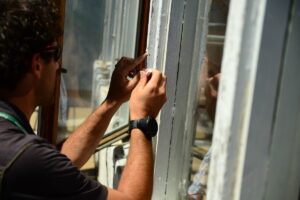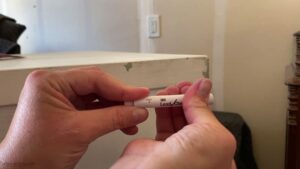You need a lead paint inspection in NYC and you need it fast. You’re either facing a Local Law 31 deadline, moving in with your newborn or buying a pre-1960 property unsure about what you’re going to deal with. Whatever the reason, you’re should hire someone to test for a substance that can cause serious health problems.
Here’s everything you need to knowing about finding qualified inspector EPA lead paint inspectors in NYC who’ll do the job right.
What Does an EPA Certification Mean?
EPA certification is legally required for anyone conducting lead inspections in NYC.
To become certified, lead inspectors you must pass an EPA-accredited inspector course and pass the EPA inspector certification exam. It requires specific training in sampling techniques, use of XRF equipment, understanding lead paint regulations, and proper documentation procedures.
But EPA certification is just the baseline. It means someone completed the minimum training to legally do this work. It doesn’t automatically mean they’re experienced, thorough, or even particularly good at their job.
Also Read: NYC Local Law 31: Lead Inspection Rules for Apartments with Young Children
Red Flags That Should Make You Walk Away
Before we talk about what to look for, let’s cover what should send you running in the opposite direction.
1. They can’t immediately provide their EPA certification number
Every certified inspector has one, and they should be able to give it to you on the spot. If they hem and haw or promise to send it later, they probably don’t have one.
2. They offer unrealistically low prices
Proper XRF testing requires expensive equipment, trained personnel, and time. If someone’s significantly undercutting market rates, ask yourself how they’re cutting costs. Usually it’s by cutting corners.
3. They promise same-day reports
Proper inspection reports take time to prepare. They need to document findings, analyze results, and provide clear recommendations. Anyone promising instant turnaround is probably providing substandard documentation.
4. They’re vague about their methodology
Ask specific questions about their testing procedures. If they can’t clearly explain their process, how many readings they take per surface, or how they document findings, keep looking.
What Qualifications To Look For
Beyond basic EPA certification, here’s what separates competent inspectors from exceptional ones:
1. Experience with NYC regulations
Lead paint laws vary significantly by location. You need someone who understands Local Law 1, Local Law 31, HPD requirements, and how these regulations interact. Ask how many NYC buildings they’ve inspected and whether they’re familiar with HPD’s documentation requirements.
2. XRF expertise
X-Ray Fluorescence testing is the gold standard, but the equipment is expensive and requires training to use correctly. Ask about their XRF equipment: what model they use, how often it’s calibrated, and how they ensure accuracy.
3. Proper insurance
Lead inspection work requires professional liability insurance and general liability coverage. Ask to see proof of insurance before hiring anyone.
4. Clear communication skills
You’ll need to understand their findings and explain results to tenants, HPD, or buyers. An inspector who can’t communicate clearly in writing and verbally isn’t worth hiring regardless of their technical skills.
Cost Considerations and What’s Reasonable
Inspection costs vary based on building size, number of units, complexity, and urgency. For an apartment, you should expect to pay anywhere between $300 and $600. Whole buildings cost more, obviously, with pricing typically structured per unit or as a flat building fee.
Make sure to be wary of prices significantly below market rate. High quality XRF equipment costs $20,000-$40,000. Certified inspectors command professional rates. Insurance, calibration, documentation, and expertise all cost money. Rock-bottom prices mean corners are being cut somewhere.
That said, also watch for price gouging. Some companies are taking advantage of the Local Law 31 deadline to charge excessive rates. Get multiple quotes to understand the market rate for your specific building.
What Happens After the Inspection?
A good inspector doesn’t just hand you a report and disappear. They should be available to answer questions, explain findings to tenants if needed, clarify recommendations, and provide guidance on next steps.
They should clearly communicate whether lead paint was found, at what levels, which surfaces are affected, and what your obligations are under Local Law 31 and other regulations.
If lead paint is found, you’re NOT required to do anything immediately if the paint is not peeling. However, you must maintain the report and take action if conditions deteriorate. The inspector should explain these scenarios to you clearly.
Making Your Final Decision
Choosing an inspector comes down to balancing cost, availability, experience, and confidence. The cheapest option rarely turns out to be the best value, and the most expensive doesn’t guarantee quality.
When you need reliable, thorough lead paint inspection services from true professionals, Manhattan Lead provides EPA-certified EPA lead paint inspectors in NYC with extensive experience in Local Law 31 compliance.
Our inspectors use high quality XRF equipment, follow rigorous testing protocols, and provide comprehensive documentation that meets all HPD requirements.




